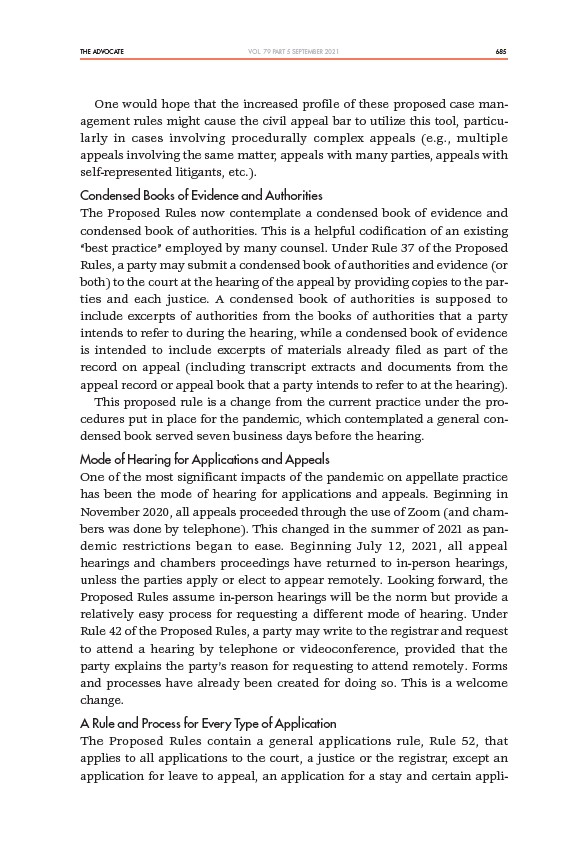
THE ADVOCATE 685
VOL. 79 PART 5 SEPTEMBER 2021
One would hope that the increased profile of these proposed case management
rules might cause the civil appeal bar to utilize this tool, particularly
in cases involving procedurally complex appeals (e.g., multiple
appeals involving the same matter, appeals with many parties, appeals with
self-represented litigants, etc.).
Condensed Books of Evidence and Authorities
The Proposed Rules now contemplate a condensed book of evidence and
condensed book of authorities. This is a helpful codification of an existing
“best practice” employed by many counsel. Under Rule 37 of the Proposed
Rules, a party may submit a condensed book of authorities and evidence (or
both) to the court at the hearing of the appeal by providing copies to the parties
and each justice. A condensed book of authorities is supposed to
include excerpts of authorities from the books of authorities that a party
intends to refer to during the hearing, while a condensed book of evidence
is intended to include excerpts of materials already filed as part of the
record on appeal (including transcript extracts and documents from the
appeal record or appeal book that a party intends to refer to at the hearing).
This proposed rule is a change from the current practice under the procedures
put in place for the pandemic, which contemplated a general condensed
book served seven business days before the hearing.
Mode of Hearing for Applications and Appeals
One of the most significant impacts of the pandemic on appellate practice
has been the mode of hearing for applications and appeals. Beginning in
November 2020, all appeals proceeded through the use of Zoom (and chambers
was done by telephone). This changed in the summer of 2021 as pandemic
restrictions began to ease. Beginning July 12, 2021, all appeal
hearings and chambers proceedings have returned to in-person hearings,
unless the parties apply or elect to appear remotely. Looking forward, the
Proposed Rules assume in-person hearings will be the norm but provide a
relatively easy process for requesting a different mode of hearing. Under
Rule 42 of the Proposed Rules, a party may write to the registrar and request
to attend a hearing by telephone or videoconference, provided that the
party explains the party’s reason for requesting to attend remotely. Forms
and processes have already been created for doing so. This is a welcome
change.
A Rule and Process for Every Type of Application
The Proposed Rules contain a general applications rule, Rule 52, that
applies to all applications to the court, a justice or the registrar, except an
application for leave to appeal, an application for a stay and certain appli-